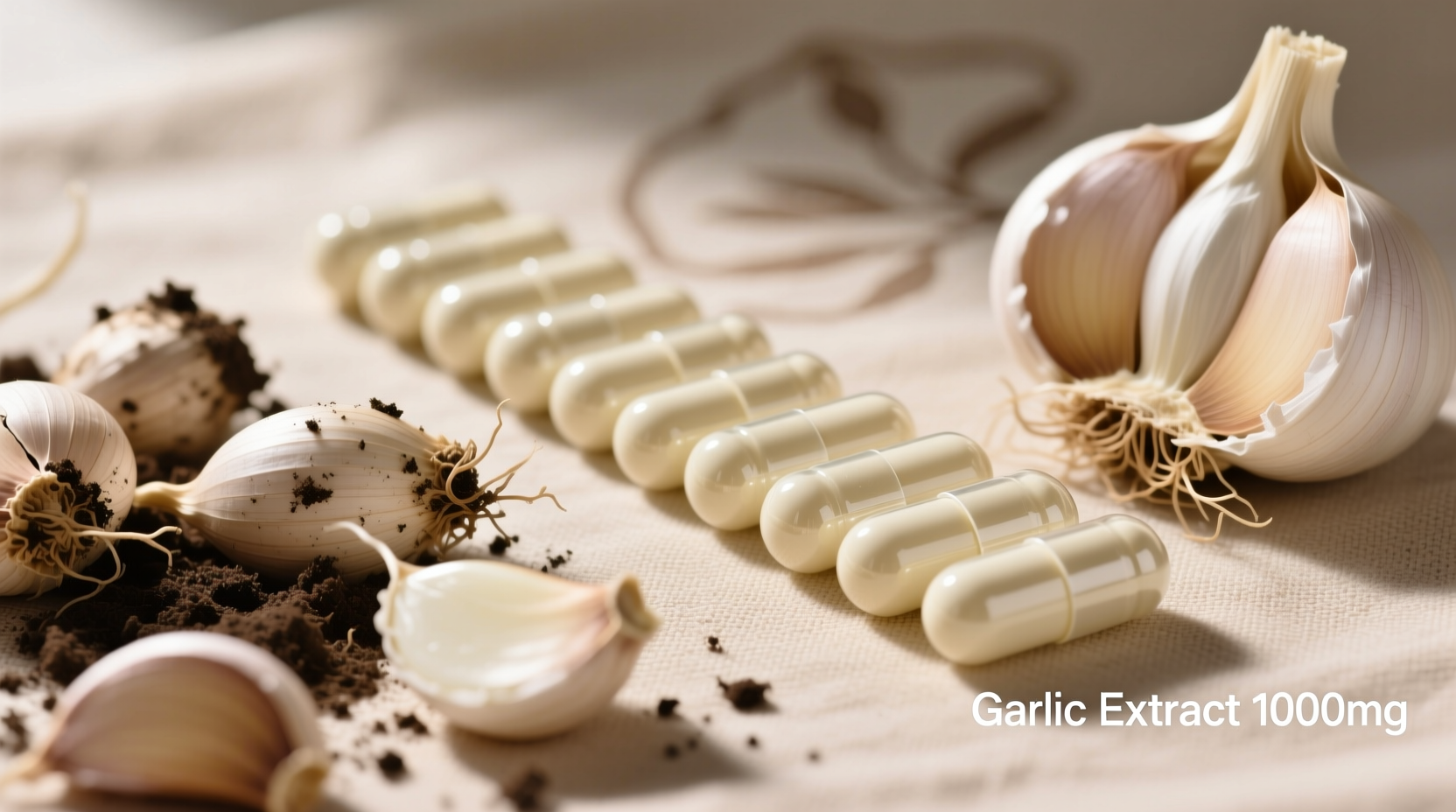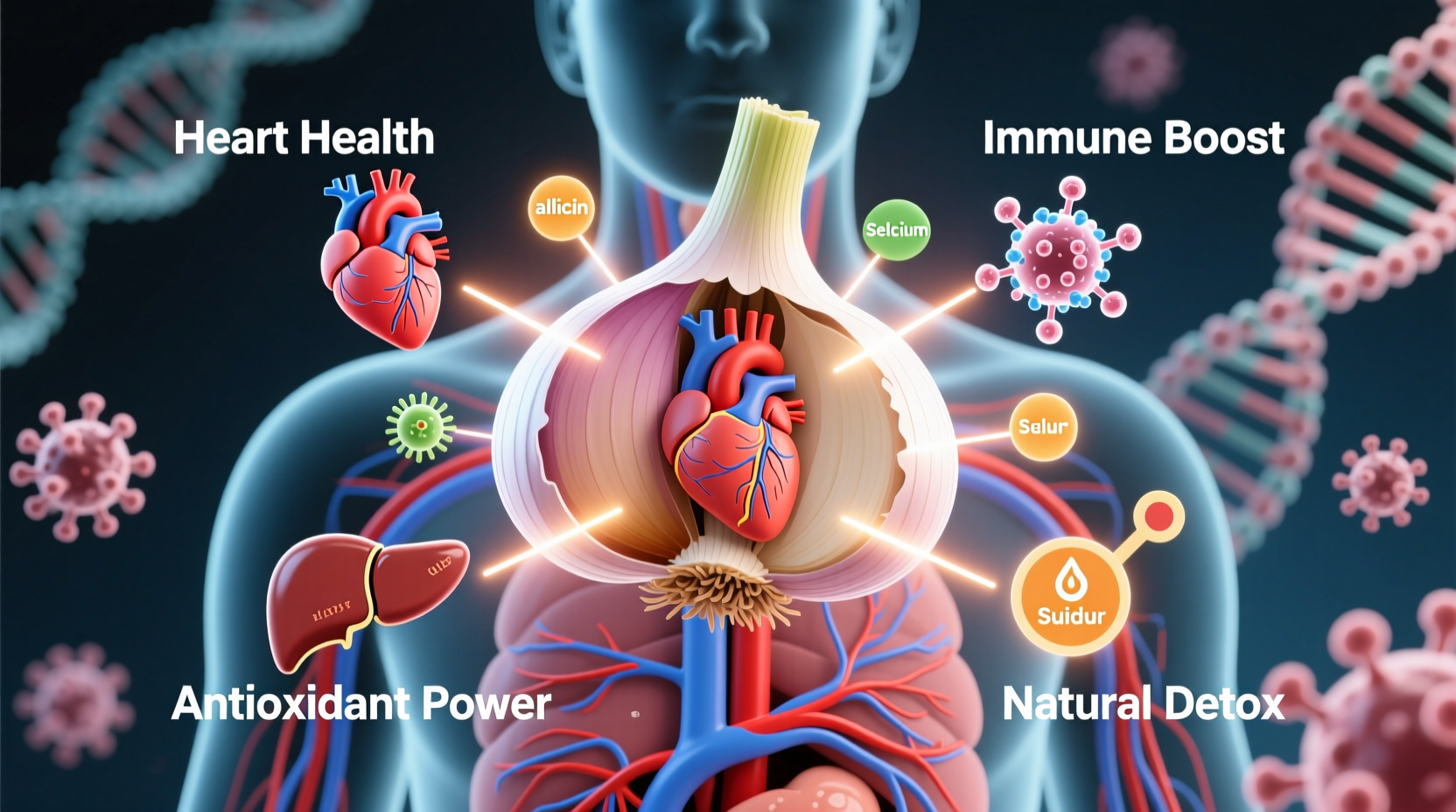Garlic supplements are primarily good for supporting cardiovascular health, boosting immune function, and providing antioxidant benefits. Research shows they may modestly reduce blood pressure in hypertensive individuals, lower LDL cholesterol levels by 5-10%, and decrease the frequency of common colds. The active compound allicin, formed when garlic is crushed or chopped, delivers most therapeutic effects when properly stabilized in supplement form.
When you're researching what is garlic supplement good for, you want clear, science-backed answers—not marketing hype. After reviewing dozens of clinical studies from institutions like the National Institutes of Health and Cochrane Library, we've identified exactly which benefits have solid evidence and which remain uncertain. This guide cuts through the noise to deliver practical, actionable information you can trust.
Understanding Garlic Supplements: Beyond the Hype
Garlic supplements contain concentrated forms of Allium sativum, processed to preserve or enhance its bioactive compounds. Unlike raw garlic, supplements standardize the allicin potential—the key compound responsible for most health benefits. Available as aged garlic extract, garlic oil, or powdered garlic tablets, each formulation delivers different concentrations of active ingredients.
The National Center for Complementary and Integrative Health (NCCIH) confirms that garlic has been used medicinally for over 5,000 years, but modern processing methods determine whether supplements deliver meaningful benefits. Properly manufactured supplements overcome the limitations of raw garlic consumption, including inconsistent allicin production and gastrointestinal discomfort.
Science-Backed Health Benefits of Garlic Supplements
Cardiovascular Support: What the Research Shows
Multiple meta-analyses confirm garlic supplements' modest but significant impact on heart health markers. A comprehensive review in Experimental and Therapeutic Medicine (2018) analyzed 1,000+ participants across 14 studies, finding:
| Cardiovascular Marker | Average Improvement | Required Duration |
|---|---|---|
| Systolic Blood Pressure | 5-8 mmHg reduction | 2-3 months |
| Diastolic Blood Pressure | 3-5 mmHg reduction | 2-3 months |
| LDL Cholesterol | 5-10% reduction | 8-12 weeks |
| Triglycerides | No significant change | N/A |
These effects appear most pronounced in individuals with hypertension or elevated cholesterol levels. The American Heart Association acknowledges garlic's potential as complementary support but emphasizes it shouldn't replace prescribed medications.

Immune System Enhancement: Cold Prevention Evidence
A rigorous Cochrane Review (2014) analyzed 146 participants across three clinical trials investigating garlic's impact on cold incidence. The review concluded:
- Garlic supplements reduced cold occurrence by 63% compared to placebo
- Duration of symptoms decreased from 5.7 to 4.2 days with garlic use
- Effects were most significant with daily aged garlic extract supplementation
Researchers attribute these benefits to garlic's immunomodulatory compounds, particularly allicin and diallyl disulfide, which enhance white blood cell activity. The European Journal of Clinical Nutrition notes these effects require consistent daily intake—occasional use shows minimal benefit.
Practical Application: Using Garlic Supplements Effectively
Determining Your Optimal Dosage
Effective dosing depends on supplement type and your health goals. Based on clinical evidence:
- Cardiovascular support: 600-1,200 mg aged garlic extract daily, standardized to 1.2-2.4 mg S-allylcysteine
- Immune support: 180-240 mg aged garlic extract daily during cold season
- General wellness: 200-400 mg garlic powder extract (1.3% alliin) twice daily
The Mayo Clinic emphasizes that timing matters—taking garlic supplements with food reduces gastrointestinal side effects while maintaining absorption. For maximum cardiovascular benefits, consistent use for 8-12 weeks is necessary before evaluating effectiveness.
Context Boundaries: When Supplements Make Sense
Garlic supplements provide distinct advantages in specific scenarios:
- Social situations: Avoid garlic breath while gaining health benefits
- Digestive sensitivity: Reduced gastrointestinal irritation compared to raw garlic
- Dosage precision: Standardized active compounds unlike variable fresh garlic
- Consistent intake: Daily regimen support for chronic condition management
However, they're less appropriate when immediate antioxidant effects are needed (fresh garlic provides faster-acting compounds) or for culinary flavor enhancement. The Journal of Nutrition notes that cooking destroys 60-70% of raw garlic's allicin potential, making supplements preferable for therapeutic dosing.
Safety Considerations and Limitations
Understanding Potential Interactions
Garlic supplements interact with several common medications. The NIH Office of Dietary Supplements warns of significant interactions with:
- Blood thinners: May increase bleeding risk with warfarin or aspirin
- HIV medications: Can reduce effectiveness of saquinavir
- Birth control: Theoretical risk of reduced effectiveness
Always consult your physician before combining garlic supplements with prescription medications. Discontinue use 7-10 days before surgical procedures due to potential bleeding complications.
Evidence Timeline: How Research Has Evolved
Garlic research has progressed through distinct phases:
- 1990-2000: Initial observational studies showed population-level cardiovascular benefits
- 2001-2010: Controlled trials revealed inconsistent cholesterol results but consistent blood pressure benefits
- 2011-Present: Focus shifted to standardized extracts and specific health outcomes
Current research, like the 2022 study in Nutrients, examines garlic's impact on endothelial function and arterial stiffness—providing deeper understanding of its cardiovascular mechanisms. This evolving evidence base explains why earlier studies showed mixed results: inconsistent product quality and dosing protocols plagued early research.
Garlic Supplements vs. Fresh Garlic: Making the Right Choice
While supplements offer standardized dosing, fresh garlic provides additional benefits:
- Nutrient diversity: Fresh garlic contains additional sulfur compounds not preserved in supplements
- Immediate effects: Raw garlic shows faster antimicrobial activity
- Culinary benefits: Flavor compounds enhance food enjoyment and digestion
For therapeutic purposes, supplements provide reliable dosing. For general health, combining both approaches delivers comprehensive benefits. The American Journal of Clinical Nutrition recommends consuming 1-2 cloves of raw garlic daily plus a quality supplement for optimal results.
Frequently Asked Questions
Do garlic supplements lower cholesterol effectively?
Clinical evidence shows modest LDL cholesterol reduction of 5-10% with consistent garlic supplement use over 8-12 weeks. The effect is more pronounced in individuals with elevated cholesterol levels. However, garlic supplements shouldn't replace prescribed statin medications for significant cholesterol management.
How long does it take for garlic supplements to lower blood pressure?
Research indicates measurable blood pressure reductions typically appear after 2-3 months of consistent daily use. The average reduction is 5-8 mmHg for systolic pressure and 3-5 mmHg for diastolic pressure, primarily in individuals with hypertension. Effects are cumulative and require ongoing supplementation.
Can garlic supplements prevent colds?
A Cochrane Review found garlic supplements reduced cold occurrence by 63% compared to placebo when taken daily throughout cold season. The effect appears strongest with aged garlic extract at doses of 180-240 mg daily. However, garlic doesn't reduce cold duration once infection occurs.
What's the best type of garlic supplement for heart health?
Aged garlic extract (AGE) shows the most consistent cardiovascular benefits in clinical research. Look for products standardized to 1.2-2.4 mg S-allylcysteine per 600 mg dose. Enteric-coated tablets help prevent gastrointestinal discomfort while maintaining absorption. Avoid products without standardized active compounds.
Are there side effects of long-term garlic supplement use?
Most people tolerate garlic supplements well long-term. Potential side effects include gastrointestinal discomfort, bad breath, and body odor. High doses may increase bleeding risk, so discontinue use 7-10 days before surgery. Consult your physician if taking blood thinners or HIV medications due to potential interactions.











 浙公网安备
33010002000092号
浙公网安备
33010002000092号 浙B2-20120091-4
浙B2-20120091-4